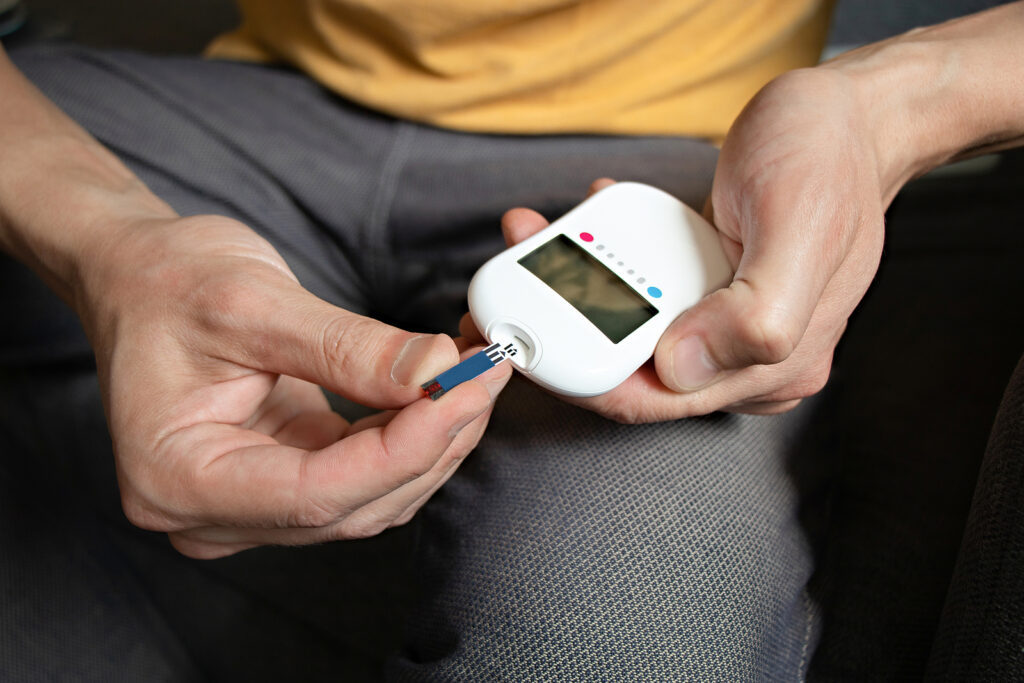
Diabetes, commonly called a silent killer, is related to blood sugar levels in the body. The warning signs can be so mild that you may not notice them. So, how do you know you have it and how severe it is? Most early symptoms are from higher-than-normal levels of glucose, a kind of sugar, in your blood.
Diabetes is increasing at an alarming rate in the United States. According to the CDC’s (Centers for Disease Control) National Diabetes Statistics Report for 2020, diabetes cases have risen to an estimated 34.2 million.
Below is a summary of the latest diabetes statistics included in the CDC’s report:
- 34.2 million people of all ages, or 10.5% of the US population, have diabetes.
- 34.1 million adults aged 18 years or older, or 13.0% of all US adults, have diabetes
- 7.3 million adults aged 18 years or older who met laboratory criteria for diabetes were not aware of or did not report having diabetes
- The percentage of adults with diabetes increased with age, reaching 26.8% among those aged 65 or older.
(CDC, Diabetes Statistics 2020)
What is Diabetes?
Diabetes is a chronic disease that occurs either when the pancreas produces enough insulin or when the body cannot effectively use the insulin it produces. Insulin is a hormone that regulates blood sugar. (WHO 2020)
Raised blood sugar is a common effect of diabetes. Over time, it can lead to severe damage to the various body systems, especially the nerves and blood vessels.
Type 1 & Type 2 Diabetes
Type 1 diabetes (previously known as insulin-dependent, juvenile, or childhood-onset) is characterized by low insulin production and requires daily insulin administration.
Type 2 diabetes (formerly called non-insulin-dependent, or adult-onset) results from the body’s ineffective insulin use. The majority of people with diabetes have type 2 diabetes. This type of diabetes is mostly the result of excess body weight and physical inactivity. (WHO 2020)
Early Signs of Diabetes
- Hunger and Fatigue – Your body converts the food you eat into glucose that your cells use for energy. But your cells need insulin to take in glucose. Lack of or no insulin presence can block glucose secretion into the cells, leading to frequent hunger and tiredness in the body.
- Excessive Thirst and Frequent Urination – A healthy body’s urination cycle is between 4 to 7 times a day, but a diabetic patient urinates more frequently. In diabetes, excess glucose started getting stored in the body, and the kidneys have to work harder to absorb and filter extra glucose. When your kidneys give up, the excess glucose is excreted into your urine, pushing along fluids from your tissues, making you dehydrated. As you drink more fluids to quench your thirst, you will urinate even more.
- Weight Loss – Frequent urination also means losing calories. Diabetes may also prevent the glucose from your food to reach your cells, leading to constant hunger. The combined effect can potentially cause rapid weight loss, especially with type 1 diabetes.
- Dry mouth and Itchy Skin – In diabetes, the body uses all the fluids and flushes it out as urine. Therefore, lack of fluid and moisture in the body can make you dehydrated, leaving your body feeling dry and itchy. ·
- Eye Swelling and Blurry Vision – When blood sugar levels are high for a more extended period, body water is pulled into the lens, causing it to swell. Longer-term causes of blurry vision can include diabetic retinopathy.
(Dansinger, 2019)
What to do in an emergency?
A diabetic emergency happens when symptoms relating to diabetes overwhelm the body. Home treatment is unlikely to help and delaying medical care could cause permanent damage or death.
Some of the signs that can indicate a serious problem include:
- Chest pain that radiates down the arm
- Difficulty breathing
- Fever
- Severe headache and weakness in one side of the body
- Seizures
- Loss of consciousness
If there are signs of an emergency, the person should go to the emergency room, or they or someone with them should call 911 immediately. Some diabetic emergencies can be life-threatening if there is no immediate medical attention.
It is obvious to feel shattered when you hear that you or your family member has diabetes. But don’t be disheartened as there are numerous ways you can stabilize this illness. With immediate medical supervision, lifestyle change, and healthy food habits, you can alter diabetes’s ill effects and get back to your daily activities as usual.
24/7 Diabetic Emergency Care
Our Board-Certified ER Physicians know how to detect a diabetic emergency. We have onsite labs and radiology for fast diagnosis or any emergency medical condition. If you suspect you are having diabetes related complications, make your way to the ER.
Works Cited
CDC, N. D. S. R. 2020. (2020). Diabetes Statistics. https://www.diabetesresearch.org/diabetes-statistics.
WHO, S. (2020, June 8). Diabetes. https://www.who.int/news-room/fact-sheets/detail/diabetes.
Dansinger, M. (2019, June 12). Early Signs and Symptoms of Diabetes: How To Tell if You Have It. WebMD. https://www.webmd.com/diabetes/guide/understanding-diabetes-symptoms.
Villines , Z. (2019, March 28). Diabetic emergencies: Warning signs and what to do. Medical News Today. https://www.medicalnewstoday.com/articles/317436.
Staff, M. C. (2019, May 25). Diabetes symptoms: When diabetes symptoms are a concern. Mayo Clinic. https://www.mayoclinic.org/diseases-conditions/diabetes/in-depth/diabetes-symptoms/art-20044248.





